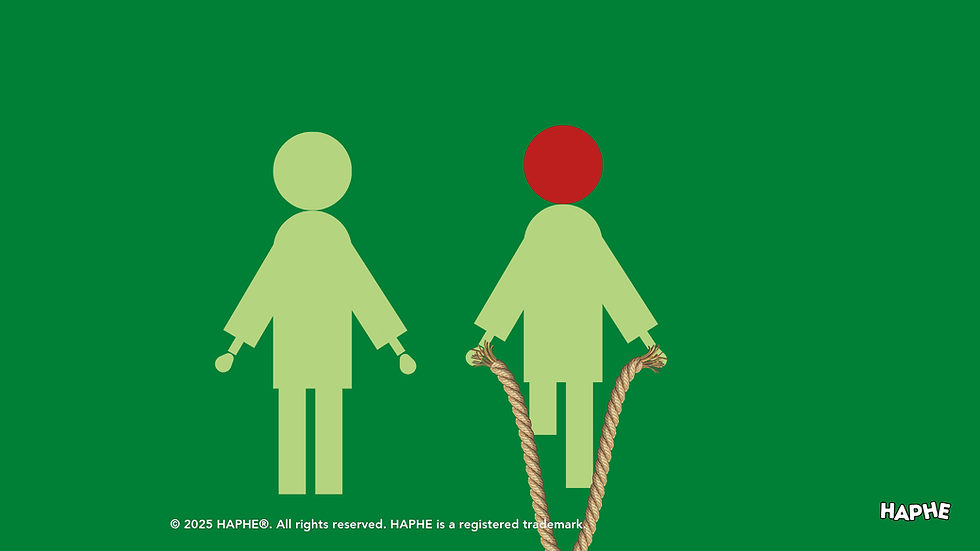Balance friendships like a pro
- Lisa Gregory
- Oct 22, 2024
- 4 min read
Updated: Dec 4, 2025
Hey, Just Ethan here—EZ if you want to keep it simple.
So, let’s talk about friendships and, well, life balance. I’m not about to get all Dr. Phil on you, but here’s the deal: balancing emotional investments in friendships is a lot like managing a basketball game.

You can’t throw everything you’ve got into just one play, one person, or one moment. It’s all about pacing, strategy, and knowing when to pass, right? This isn’t just me talking; HAPHE's philosophy backs it up with the whole “well-being” focus, where every connection we make is meant to serve the big picture: our own wellbeing!
Let me tell you a story about one of my close friends—let’s call him Alex. We met in college orientation, both of us a bit lost, trying to navigate freshman life and figure out how not to look like total newbies. We clicked immediately, like slam dunk levels of compatibility. He was chill, funny, and we shared a weird obsession with memorizing random trivia (did you know that honey never spoils? Yeah, Alex told me that one).
Before I knew it, we were inseparable. Game nights, library sessions, even hitting up the gym together. If I wasn’t with Alex, people would ask where he was, like we were a package deal. And that’s where I started to realize—I was spending way too much time investing in just one “asset” in my social portfolio, if you get what I mean. It was like having all your money in one stock, and any investor will tell you that’s risky business. But with friendships, it feels different…until it doesn’t.
Cue the Unexpected Turn
Then came sophomore year, and Alex got into a relationship. Suddenly, my dude was MIA half the time, buried in coupledom. Our Friday night hangouts turned into “I’ll catch you later, man; we’re going out,” and I’m not gonna lie—it felt like getting benched for half the season.
One night, after he bailed last minute on a game we’d planned to watch, I found myself sitting there, feeling a weird emptiness. Here’s the guy I’d invested so much in, and now he’s basically ghosted me for his new girl. But then it hit me—this wasn’t really on Alex. I’d built my whole social life around one person, forgetting that friendships, like HAPHE teaches, are meant to balance out your well-being, not overload one connection with everything.
Action, Reflection, and a Little HAPHE Wisdom

That night, I decided I’d try something different. I grabbed my camera, which I’d barely touched since freshman year, and just walked around campus snapping photos. It felt weirdly therapeutic, capturing all these random moments.
Basketball was great, sure, but there was something about photography that gave me space to think. And in that quiet, I started to understand a bit of what HAPHE calls “diversifying emotional assets.” Just like with finances, putting all your energy into one relationship or friend is like over-investing—it’s risky if things don’t pan out.
From that point on, I started building up other friendships. I reconnected with some guys from the team and even joined a study group (not something I’d ever planned, but hey, turns out it’s not as boring as it sounds). Little by little, I realized that spreading my time and energy around didn’t make me any less close to Alex; it just made me a bit more resilient, a bit more me.
Takeaways for Anyone Out There Over-Investing in Friendships
Here are a few things I’ve learned that might help you find balance:
1. Remember the Big Picture:
Friendships should serve your well-being, not drain it. HAPHE’s philosophy emphasizes connecting with others for the good of the whole—you. So if a connection is making you feel empty when it’s absent, it might be time to diversify.
2. Diversify Your Social Portfolio:
Just like you wouldn’t put all your money in one stock, don’t put all your emotional energy in one friend. Build relationships with different people, and don’t forget your hobbies. They’re all pillars that keep you grounded.
3. Keep a Piece of Yourself, for Yourself:
It’s easy to let friendships define us, but remember who you are outside of any relationship. For me, picking up my camera reminded me of a part of myself I’d been ignoring.
4. Value Quality Over Quantity:
A solid friend or two is better than stretching yourself too thin with surface-level connections. Choose people who genuinely add to your life and well-being.
5. Embrace Change with Flexibility:
Friendships will ebb and flow. That’s just life. Being able to adapt, let go a little, and make space for new connections is key to emotional resilience.
Looking back, balancing out my friendships with other interests wasn’t just a way to “protect myself”; it was a way to become a fuller, stronger version of myself. And who knows? Maybe next time Alex bails, I’ll be busy anyway—doing my own thing because I’ve built a solid, balanced foundation.
So yeah, life’s a bit like basketball. Sometimes, you’ve gotta pivot, pass, or take a shot on your own. But as long as you keep your balance and play with intention, every connection—friend, teammate, or otherwise—will make the journey that much richer.